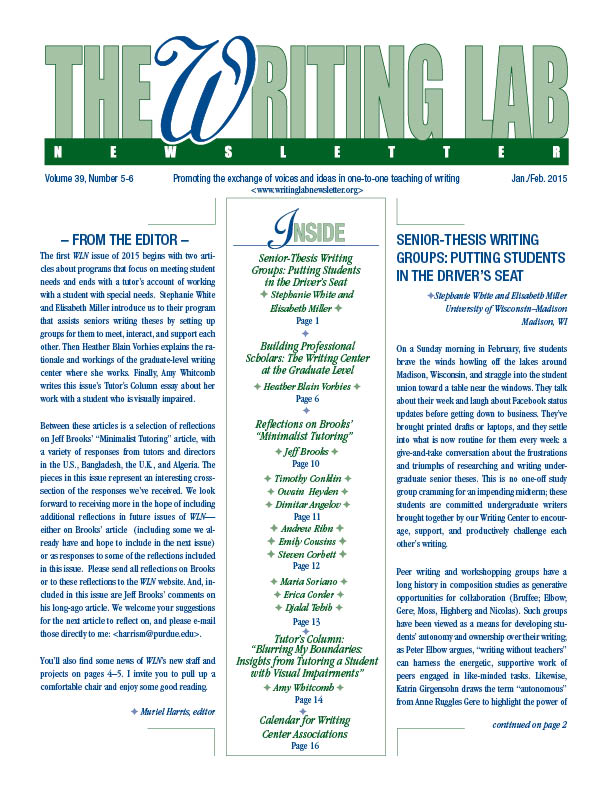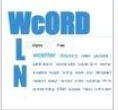Promoting the exchange of voices and ideas in
one-to-one teaching of writing.
The Writing Lab Newsletter is a forum for exchanging ideas and information about writing centers in high schools, colleges, and universities.
Articles focus on challenges in tutoring theory and methodology, handling ESL issues, directing a writing center, training tutors, adding computers, designing and expanding centers, and using tutorial theory and pedagogy.
In addition to articles, issues contain conference announcements, book reviews, professional news, and a column by and for tutors. The newsletter is published bi-monthly from September to June.
CURRENT ISSUE: May & June 2015
 "What began as a newsletter has long since developed into a peer-reviewed journal, and our new name will honor that change." - Muriel Harris, editor
"What began as a newsletter has long since developed into a peer-reviewed journal, and our new name will honor that change." - Muriel Harris, editor
"They Speak My Language Here: An ELL-Specific Tutoring Pilot Project in a Midwestern Regional University" - Anne Canavan
"What's WcORD and How Do You Pronounce It?" - WLN Editorial Staff
Reflections: "It's Not Just Beans Anymore; It's Our Bread and Butter" - Scott Pleasant
Reflections: "Reflecting on Lerner's Bean Counting Articles" - Lauren Gregory
Reflections: "Reflection on Lerner's Bean Counting" - Frances Crawford
Reflections: "Neal Lerner Responds" - Neal Lerner
"'Just Write?'...Not Quite: Writing 'Procedure' for STEM-Focused Dissertation Boot Camps" - Brandy Blake, Joy Bracewell, and Clint Stivers
Tutor's Column: "Translate-Communicate-Navigate: An Example of the Generalist Tutor" - Dory Hammersley and Heath Shepard [ CLICK TO READ ]

39: 9-10: MAY/JUNE 2015:
Tutor's Column: "Translate-Communicate-Navigate: An Example of the Generalist Tutor"
Dory Hammersley and Heath Shepard
Boise State University
Boise, Idaho
Writing center consultants are typically trained to work with a diverse group of students on a variety of writing projects from many disciplines. As many universities (like ours) are adding Writing Across the Curriculum requirements to existing courses, we've seen an increase in students bringing in writing from majors we know very little about. As centers search for solutions to these changes, the debate over generalist and specialist tutoring rages. Sometimes papers—from physics to chemistry to engineering to business classes—seem like they are in a different language, and in these instances it is helpful to know the subject matter. However, it is not always necessary. As consultants who have experience working with students writing papers in these disciplines, we propose a way of looking at generalist tutoring that can be very helpful in working with writers from these various disciplines. As a case study, we will use a consultation that one of us, Dory, had with the other, Heath.
Dory was taking an upper-division French literature class and was working on a literary analysis. She considered whether she should bring her latest paper into the Writing Center since she often had trouble with these papers. She was confident writing in English, but when she transferred her thoughts into French, her writing lost much of its finesse. Dory had been making slow progress as she experimented, but was disheartened by consistently low grades on her papers. She found herself in the unfamiliar situation of disliking writing and stopped putting much work into it. Her writing began to have issues not just at the sentence level, but also in its content. She shared her frustration with our Assistant Director, Melissa Keith, who encouraged her to bring her next assignment in to the Writing Center to brainstorm. Dory thought it might be too much of an obstacle because the text she was analyzing, the paper she would be writing, and even the assignment sheet were in French, but eventually pragmatism won out. She made an appointment with Heath, willing to try despite her reservations about language.
This consultation is an example that can open the door to understanding how diverse our skills as generalist tutors can be. In her article "A Tutor Needs to Know the Subject Matter to Help a Student with a Paper: __Agree __Disagree __Not Sure," Susan Hubbuch says, "the ignorant [generalist] tutor, by virtue of her ignorance, is just as likely—perhaps even more likely—than the expert to help the student recognize what must be stated in the text" (28). Rather than preventing us from helping a student writing in an unfamiliar subject, our "ignorant tutor," generalist approach is effective and valuable. As generalist tutors, we bring our knowledge of writing to the consultation while the writer brings his knowledge of the subject matter. In most cases, this combination gives us everything we need for a successful consultation.
Sitting down to talk, neither Heath nor Dory knew exactly how the consultation was going to proceed, but we started like we typically start any consultation. Heath asked questions about the assignment, and we discussed different approaches to the paper. Our training emphasizes the non-directive approach, which worked especially well in this situation where the content was unfamiliar. Dory acted as a translator of her own ideas and of the rhetorical strategies needed in her subject area. This fits into what Jeff Brooks tells us in "Minimalist Tutoring," that "the student, not the tutor, should ‘own' the paper and take full responsibility for it" (83). In our consultation, Dory was literally translating for Heath, but this mindset can apply even in consultations that occur exclusively in English. When relying on writers to translate subject matter that is unfamiliar to us, we help them to better understand and write in their own field of study.
In this consultation, Dory worked as the translator to communicate not only the information in French, but also her own ideas to Heath. Dory explained that the text she was analyzing, a letter in an epistolary novel called Lettres Persanes, was sarcastic, and from there we were able to brainstorm a thesis. She came up with the ideas: Heath was simply the guide to help her get everything out of her head and onto the paper, all without speaking a word of French. For a better idea of how this worked, here are some illuminating moments from the consultation:
Dory had a particular letter from the book picked out to analyze, and Heath asked her why she had chosen it. She said that there was a difference in tone from the rest of the book that was interesting. This section had also sparked a debate in class, and she was still trying to pinpoint what she thought about it. She had decided to focus on this letter in order to work through her own ideas and come to a conclusion.
Heath asked what parts were the most interesting, so Dory pulled out the book, held it between them on the table, and started pointing out and translating quotations and explaining how they related to her ideas. She marked them in the book for later reference.
Heath requested background information, and Dory explained the plot and cultural and historical elements that were important to understanding this passage, solidifying them in her own mind.
Dory eventually felt comfortable enough to generate a thesis in English. She translated it into French later when she wrote her paper.
These snapshots show how Heath was able to facilitate a consultation in a subject he would not be able to work in without Dory as a translator. In any appointment, consultants often have to rely on the knowledge of the writer in order to have a successful consultation. We fall back on a minimalist approach, asking questions like these:
"I'm having trouble understanding this concept. Could you explain it to me?"
"Is this word one that someone in your field would immediately understand, or do you think it needs more explanation?"
These types of questions rely on the writer's knowledge and empower her to bring her own content-area expertise into the consultation, as well as help her become more aware of the conventions of writing in her own field of study. These are exactly the kinds of questions Heath asked during this consultation. Though this particular paper was a literary analysis, a genre the consultants in our English-major-dominated writing center are comfortable with, the language issue made the subject matter quite foreign. Dory, with her knowledge of French, knew that the ways ideas are expressed in that language are different, and had to allow for that. Heath relied on Dory as a translator, and the conversations went like this:
Heath: "You were talking about the tone of this letter being different than the others in this book. What made you think that?"
Dory: "Well, right here Rica sounds really sarcastic, talking about his own culture as ‘simple' and ‘naïve.' In the other letters, he isn't as caustic."
This consultation allowed Dory to develop her thoughts as she figured out how to explain them clearly to Heath. After her appointment with Heath, Dory went home actually feeling excited to write, put a good amount of work into the paper, and got it back a week later with an A-. Dory proudly showed Heath and Melissa her paper, with her professor's big "Bien!" scrawled next to the thesis statement, and we exchanged high-fives.
Every day, consultants meet with students who range from ELL to graduate-level. The writing is different not only due to the writer's abilities, but also due to the range of disciplines that come in to seek our help. The thought of separate training for each of these scenarios is not only daunting, it is unrealistic for most writing centers. Consultants who listen and ask the right questions, no matter what the content, have the ability to navigate these diverse situations by focusing on the writing process through conversations with the writer. Both participants—consultant and writer—bring their own knowledge to the table in a collaboration. If the consultant thinks of the writer as the translator of his or her own ideas from thought form to written form, the writer is empowered and the consultant has the proper non-directive, guiding role. F
Works Cited
Brooks, Jeff. "Minimalist Tutoring: Making Students Do All the Work." The St. Martins Sourcebook for Writing Tutors. Ed. Christina Murphy and Steve Sherwood. New York: St. Martin's, 1995. 83-87. Print.
Hubbuch, Susan. "A Tutor Needs to Know the Subject Matter to Help a Student with a Paper:__Agree __Disagree __Not Sure." Writing Center Journal 8.2 (1988): 23-30. Print.
 JOIN US ON TWITTER: #WLNewsletter
JOIN US ON TWITTER: #WLNewsletter FIND US ON FACEBOOK: writinglabnewsletter
FIND US ON FACEBOOK: writinglabnewsletter SEARCH ONLINE RESOURCES: WcORD (Writing Center Online Resource Database)
SEARCH ONLINE RESOURCES: WcORD (Writing Center Online Resource Database)